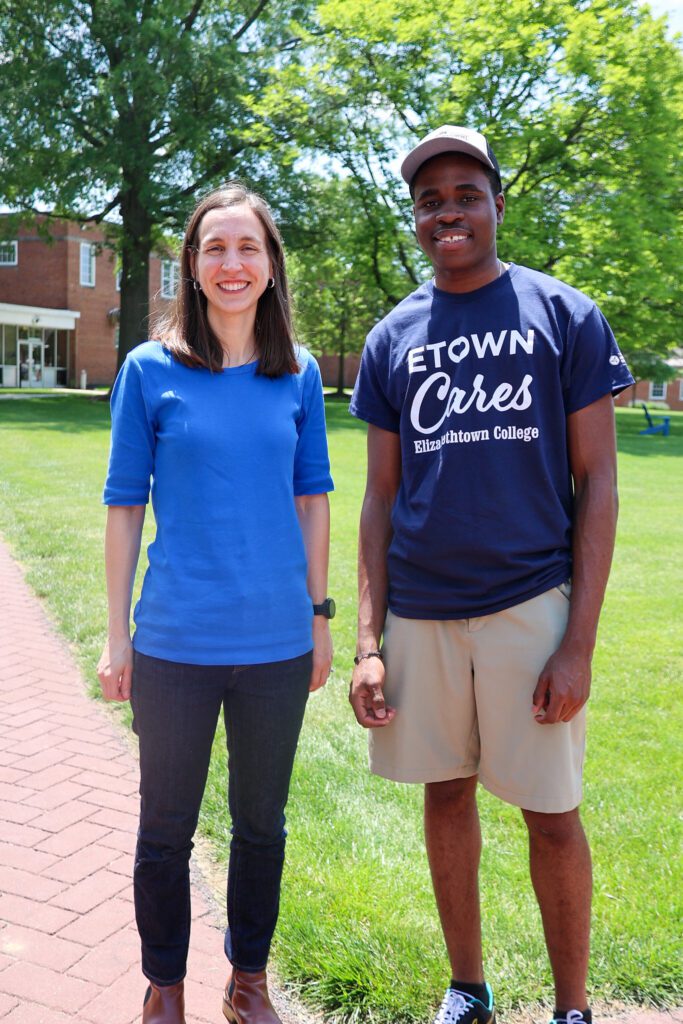Mechatronics Engineering major Emmanuel Attah ’27 is spending his summer on campus researching what it would take to transition Elizabethtown College’s electricity consumption to 100% solar. In addition to gaining in-depth knowledge about how solar panels work and their substantial benefits, Attah is hoping to raise awareness for sustainability at the College and explore the feasibility of this hypothetical initiative.
Attah has worked alongside faculty mentor, Associate Professor of Engineering & Physics Brenda Read-Daily to complete this research as part of the Summer Creative Arts and Research Program (SCARP).
Title of Research
What Would it Take to Offset 100% of Elizabethtown College’s Electricity Consumption with Solar Power?
Student Researcher
Emmanuel Attah ’27 (Mechatronics Engineering major)
Faculty Mentor
Dr. Brenda Read-Daily, Associate Professor of Engineering & Physics
What are you researching?
Attah: In this project, I explore the feasibility of Elizabethtown College offsetting 100% of its electricity consumption by installing solar panels on campus buildings and parking lots. Right now, approximately 20% of the College’s electricity consumption is currently sourced from the on-campus solar array. While investing in the design and installation of solar panels of this magnitude would represent a substantial cost, it has the potential to save the College a significant amount of money over the long term. To derive these answers, I have to conduct varying analyses. I explore how much electricity the college demands, matching the appropriate size and number of solar panels. Using satellite imagery tools and other software, I find out how much roof and parking space are available and how much electricity can be generated from this onsite system. Then I conduct engineering economic analysis to estimate the cost of the design and project the payback period from the initial investment.
Why did you choose this topic?
Attah: Renewable energy has been a topic of great interest to me. I believe the field of renewable energy is largely untapped and has more room for innovation. Many people are not aware of the empirical benefits of solar energy on the environment, utility costs, and other issues. This impact of sustainable energy is even more pronounced in developing countries like Nigeria, where I come from. My country struggles with unstable and unreliable electricity infrastructure that hampers learning in schools, increases reliance on petroleum products, etc. Through this research project, I will gain a deeper understanding of solar energy and its real-life applications, drawing me closer to my goal of making sustainable energies more accessible in my home country. This opportunity also offers me a peek into the engineering world as I work with technical instruments, think creatively, and interpret my findings economically as I project the financial benefits of this technology for Elizabethtown College. Overall, this is a unique opportunity I was not going to pass up.
What is the most interesting aspect of this research?
Attah: This project has many facets, but what I find most interesting is seeking answers. I’m asked, ‘What would it take for Etown to go completely solar?’ I have no clue. Nobody in the world knows the answer. And so, the fact that I get to run the numbers and conduct the analysis for such an important question is very cool.
What are you hoping to accomplish through this research?
Attah: With this project, I aim to contribute to the College’s sustainability efforts by focusing on solar energy as a key component of creating a green, energy-efficient campus. I will evaluate and demonstrate the long-term financial benefits of solar energy, showing how it can save the College money while also addressing broader environmental issues like carbon emissions and food waste. Additionally, I seek to gain in-depth knowledge about solar panels and their benefits, along with practical skills that will support my future success.
How has your faculty mentor helped you?
Attah: Dr. Read-Daily has been a great mentor and an indispensable resource throughout this experience. She has been incredibly patient in guiding my research to ensure maximum results. As a mentor, she offers ideas and sets goals, but she also allows me to work out the details to reach these outcomes. Dr. Read-Daily is incredibly enthusiastic about her work, and it has been a privilege working with her.
Hear from the faculty mentor – Brenda Read-Daily
“It’s truly an honor to collaborate with Emmanuel,” Read-Daily said. “His commitment to sustainability is evident, and he exhibits a strong motivation to learn as much as he can about photovoltaics (PV) and perform the necessary analyses for designing PV systems.”

